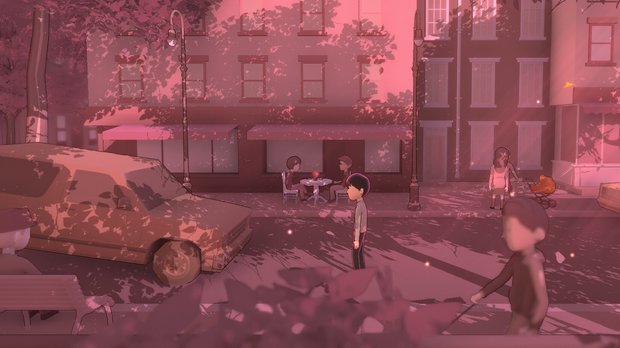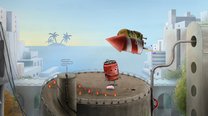Unwording review

- 0 Comments
Casual dialogue-free puzzler elicits a mix of positive and negative thoughts
Cognitive distortions are irrational thought patterns that can lead to self-doubt, anxiety, and depression. Cognitive behavioral therapy teaches people how to recognize these distortions, reframe them to something rational, and then change their behavior to match. Unwording, the third game from Frostwood Interactive (Rainswept, Forgotten Fields), is a journey of three days in the life of one man who’s currently stuck in a negative thought spiral. Rather than watching him work through this in therapy, you will get to help him by playing word games with the goal of reframing his destructive thoughts. While the premise is charming and the mini games are occasionally fun, this very short adventure lacks the depth and polish to fully raise it out of the doldrums.
The first day begins in bed with Tom struggling to brave the world as the player tackles the first word puzzle. The phrase “Wake Up” is emblazoned across four two-dimensional blocks, each block consisting of one to three letters. Tom clearly does not want to do this, however, so you’re asked to move the blocks around to come up with a phrase that matches his current cognitive distortion. Pressing the space bar produces a word cloud of Tom’s internal thought pattern to help guide you to the correct answer; in this case, phrases like “Go back to sleep” and “Quit” are floating around his head. You then must flip the blocks and utilize the letters on the other sides to find the correct phrase. While you don’t need to do anything to the word “Up” in this case, once you turn the blocks that make up the word “Wake,” the phrase “Give Up” will complete the puzzle and advance the story.

When Tom does finally get out of bed, he’s clearly none too happy about it so you must continue to drag him through his daily routine, solving similar puzzles that simply reinforce his negative thought patterns. You’ll avoid neighbors, coworkers, and anything resembling joy to just get him through the day.
On the second day, thanks to the help of an optimistic neighborhood canary that has pooped all over his smartphone, Tom begins the process of reconsidering his place in the world and how others fit into it. In a neat progression, the world changes from 2D to 2.5D and so do the word puzzles. These new puzzles, much like doing therapy, require a little extra work and perseverance. Rather than simply flip the blocks over, you now must rotate them in place until they correctly align with the needed phrase. By doing so, Tom will reframe his negative thoughts and be rewarded with a little more joy in his day.
On the third and final day, the world changes to 3D and the puzzles become harder still. Tom will be presented with text boxes and you must type in the correct word to advance the story. In some cases, like going through a door, the answer will be fairly obvious. Others require more lateral thinking. As a longtime fan of text adventures, I typically enjoy typing in my answers, though I ran into some unfortunate guess-the-verb issues in this section of the game.

This approach to mental health recovery is clearly reductive, but it’s a nice introduction to the topic and a fun excuse for some word puzzles. There is an easy mode and a normal mode (which only seems to affect the first section), with the former confirming each letter block as it’s correctly placed and providing a hint option that places blocks correctly for you upon request. Hints really shouldn’t be needed, however; I chose the normal mode and found little challenge with the block puzzles until some late game trial and error with the text parser.
Unwording strictly uses the keyboard and mouse and should not give players any difficulty. Moving Tom around is straightforward, and it’s generally easy to tell what and who he can interact with, especially since you typically visit all the same locations (e.g. the office, storefronts outside your apartment) in the same order each day. The characters and backgrounds are done in a simple cartoony look throughout that, while not unpleasant, is also not terribly interesting. There’s very little in the way of animation either, outside of Tom walking and the occasional hand gesture he makes to others. Most actions, such as grabbing something from the fridge, or sitting down to work, are presented with a fade to black and then the result. The game does have some graphical difficulties, as Tom’s arms and legs will frequently go through walls and other scenery. This is not a concern gameplay-wise as you can’t get stuck, but it does make the experience feel a bit sloppy.
There is no dialogue in the game and the only character interaction shown is via non-verbal communication. To compensate for this, as Tom’s perspective on life improves over the course of the three days, he smiles more often, his posture gets better, and the hues of his world incrementally grow brighter. Background music consists of gentle rhythms and dulcet tones, and there are basic sound effects that accompany certain actions such as opening a door or running the washing machine.
Final Verdict
The game bills itself as an uplifting and powerful story, though there’s not nearly enough character development or story to deserve these adjectives. Tom is the definition of generic (as is everyone else here), and his mental health transformation is too abrupt to elicit pathos. About ninety minutes is all it takes to see everything there is to see in Unwording. Given the simplicity of the narrative and the minimal variety of puzzles, that’s about the right length. Those who are interested in the topic and are keen to get their hands on any game with word puzzles will likely find themselves enjoying a very short but pleasant diversion. Otherwise there’s little else to recommend to anyone seeking a full-fledged adventure game experience.
Hot take
While Unwording succeeds in creatively introducing the mental health concepts of cognitive distortions using wordplay, the surrounding game is simply too short and too shallow to make a lasting impact.
Pros
- Unique presentation of an important mental health topic
- Briefly entertaining word puzzles
Cons
- Story lacks depth
- Characters feel like cardboard cutouts
- Jarring graphical issues can take you out of the moment
Beau played Unwording on PC using a review code provided by the game's publisher.










0 Comments
Want to join the discussion? Leave a comment as guest, sign in or register.
Leave a comment